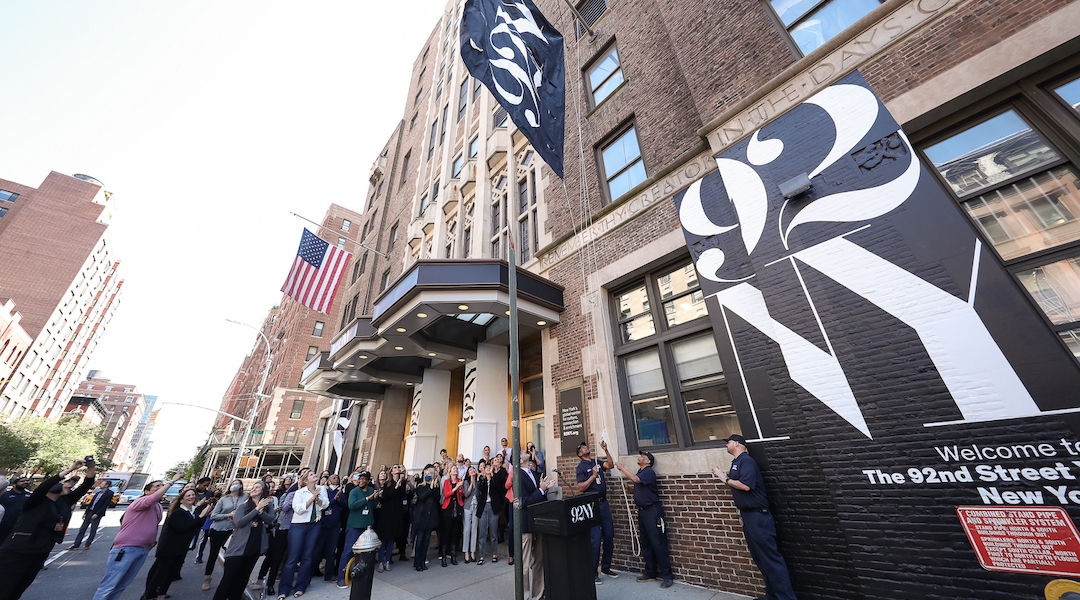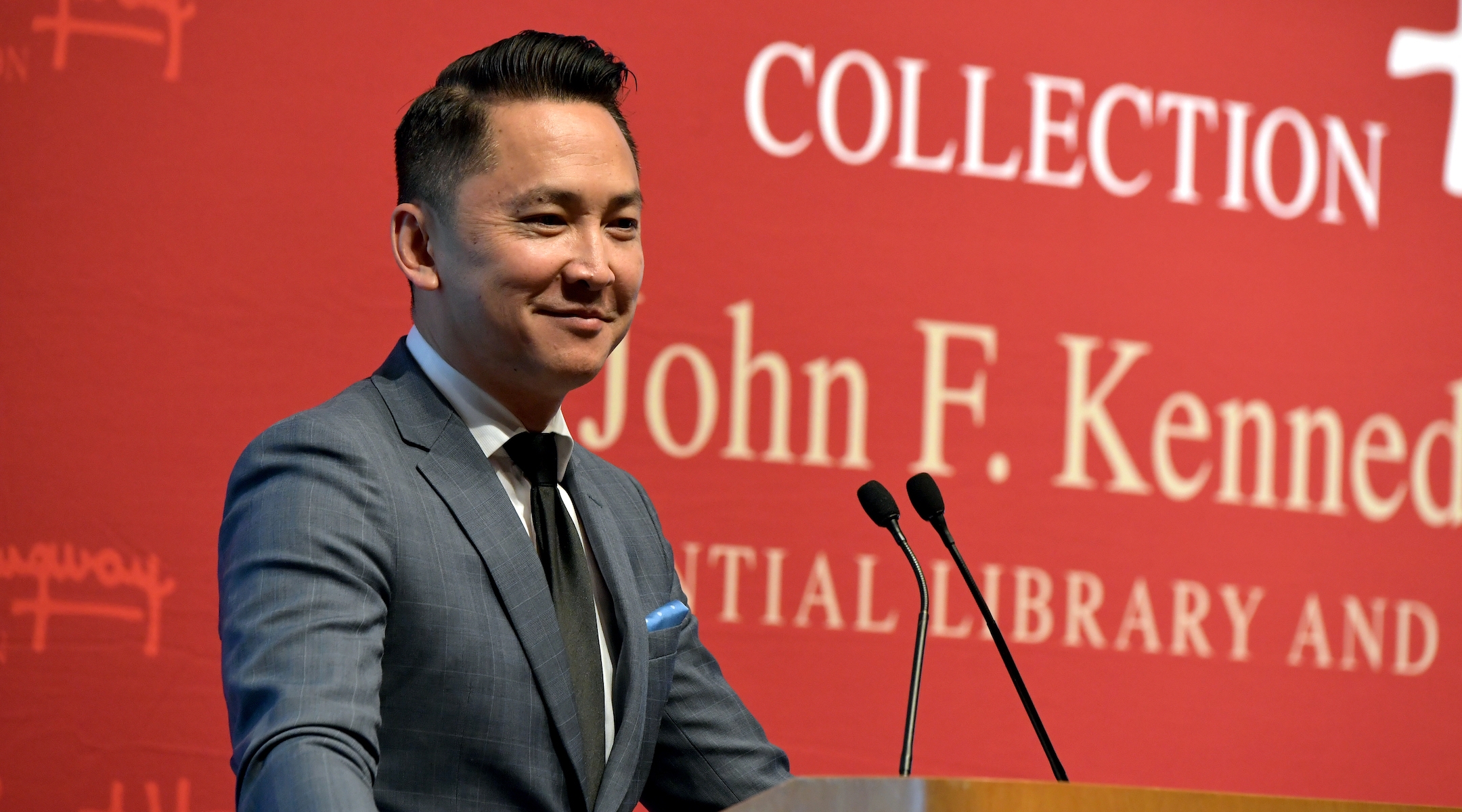92NY implodes over cancellation of Israel-critical author event
For some Jewish institutions still reeling from Hamas’ attacks, their usual rules of pluralism and commitment to fostering diverse opinions have been hard to apply

The 92nd Street Y unveils its new name and branding — “The 92nd Street Y, New York” – at a news conference at its Upper East Side building, May 10, 2022. (Karl Ault/Michael Priest Photography)
(JTA) — It took less than four days for 92NY to go from having a packed calendar of literary events and a full team to a depleted schedule and staff resignations.
The dramatic shakeup at the venerable New York Jewish cultural center came after the institution scrapped a planned talk Friday by Pulitzer Prize winner Viet Thanh Nguyen, after Nguyen signed an open letter in the London Review of Books that pushed for “an end to the violence and destruction in Palestine,” accused Israel of “ethnic cleansing” and condemned “the deliberate killing of civilians” — without denouncing Hamas specifically.
Staff at the 92NY told the press it had made the decision out of concern for its Jewish audience.
Following the decision, which 92NY’s leaders made only hours before Nguyen’s planned talk, a slew of other authors pulled out of its upcoming programming slate. On Tuesday, staff at the center began resigning over the controversy, including poetry center director Sarah Chihaya and senior program coordinator Sophie Herron.
The blowback led the organization to announce Monday it was pausing its current poetry reading series.
The fallout came amid a series of Israel-related clashes at cultural centers and within the arts and entertainment world at large since Hamas’ Oct. 7 attacks. Disputes over the attacks and Israel’s retaliation have also spilled into sports, academia, government, tech, business and law.
As Israelis and Palestinians bury their dead, both sides are demanding major institutions pick sides. And for some Jewish institutions, reeling from a Hamas attack that killed 1,400 Israelis and saw 200 others taken hostage, their usual rules of pluralism and commitment to fostering diverse opinions are harder to apply.
“It’s certainly challenging to navigate this moment as a cultural organization (much less a Jewish one) and ensure that we are remaining mission-aligned even in complicated situations,” said Naomi Firestone-Teeter of the Jewish Book Council, which books Jewish authors at JCCs and other venues around the country. “We are hearing from new authors every day who need an outlet to share their experience and ensure our global readership is aware of the pain and suffering in the Jewish community — in Israel and the Diaspora.”
Andrea Grossman, founder and director of the influential Los Angeles literary nonprofit Writers Bloc, recently canceled a planned book talk with the Jewish author Nathan Thrall because Thrall’s new nonfiction book, “A Day In The Life of Abed Salama,” deals critically with Israel’s military occupation.
Released days before Hamas’ attacks and dealing with the aftermath of a 2012 bus explosion in the West Bank, the book has become one of many Israel-related political footballs in the arts arena: American Public Media, a national content distributor for public radio and TV stations, recently told The New York Times it had pulled ads for Thrall’s book, saying they would be “insensitive in light of the human tragedies unfolding.” Thrall has undertaken his book tour alongside his subject, Abed Salama, a Palestinian father of a five-year-old boy who died on the bus in 2012.
“How does one promote a program on this subject to a largely Jewish audience when people on all sides are being bombed, killed and buried? The community is deeply polarized,” Grossman told the Guardian.
Thrall, who lives in Jerusalem, called the cancellations “outrageous.”
“There’s an atmosphere that is wholly intolerant of any expression of sympathy for Palestinians living under occupation, any discussion of the root causes of the conflict,” he told the Guardian. “My book is not a polemic. It’s been praised for showing characters, both Jewish and Palestinian, in an empathetic way.”

Pulitzer Prize-winning author Viet Thanh Nguyen speaks at the PEN/Hemingway 2019 Award Ceremony at The John F. Kennedy Presidential Library And Museum on April 7, 2019 in Boston. (Paul Marotta/Getty Images)
Questions of “polarization” and “sensitivity” also seemed to be on the mind of the organizers of the Frankfurt Book Fair, a major global publishing gathering held last week in Germany. Hundreds of authors and literary professionals objected last week after organizers announced that, owing to “the war started by Hamas,” they would no longer host a prize ceremony for Palestinian author Adania Shibli.
In a statement last week, the fair’s prize affiliate, Litprom, said that it would not hold the ceremony at the Frankfurt fair as planned, “due to the war started by Hamas, under which millions of people in Israel and Palestine are suffering.” Organizers said they planned to hold the event in “a suitable format and setting” at “a later point,” and that they still intended to give it to Shibli, whose novel “Minor Detail,” released in English in 2020, recounts the 1949 gang-rape of a Bedouin Palestinian girl by Israeli soldiers.
Shibli’s English-language publisher called the decision “cowardly” and accused the fair of lying about the author’s willingness to agree to the plan.
The cancellation happened only days after the fair’s organizers had vowed on Instagram to “make Jewish and Israeli voices especially visible at the book fair.” Hundreds of authors and publishing industry professionals charged in a letter that organizers had made an inappropriate judgment in “closing out the space for a Palestinian voice.”
Among the signatories were the Man Booker Prize finalist Sarah Bernstein, who is Jewish, and the Polish Nobel laureate Olga Tokarczuk, whose most recent novel “The Books Of Jacob” is a deep dive into Jewish history.
PEN America, the literary and free speech nonprofit, weighed in on the Nguyen and Thrall controversies in a statement also noting “events canceled or postponed due to security concerns, including Jewish cultural events in Sweden; an exhibition of Hebrew manuscripts in Australia; and The Witness Palestine 2023 Festival in Rochester, New York.”
PEN was founded, its statement said, “on the idea that writers could play a role in preventing future wars; that when governments are locked in conflict, writers and literature can provide comfort, a bridge to empathy across divides, even a roadmap toward the faraway horizon of understanding. At a moment of great anguish, we urge the literary community to double down on that essential potential.”
The 92NY in particular has sought to operate as both a major nonsectarian cultural institution and an organization proud of its roots in the Jewish community. Formerly known as the 92nd Street Y, the institution recently rebranded itself to emphasize its outsized role in the general New York City cultural community, while also making some hires and programming moves to make its Jewish connections more explicit.
“92NY is a Jewish institution that has always welcomed people with diverse viewpoints to our stage,” 92NY said in a statement. “The brutal October 7th attack by Hamas on Israel and the continued holding of hostages, including senior citizens and young children, has absolutely devastated the community. As a Jewish organization we believe the responsible course of action right now is to take some time to determine how best to use our platform and support the entire 92NY community, so we made the difficult decision to postpone the October 20th event.”
But while its leadership seemed to want to put the Nyugen’s event on hold until it could figure out how to orient itself in the wake of Hamas’ attacks, some writers who pulled out of events there saw darker motives. The critic Andrea Long Chu called the group a “pro-war nonprofit.”
“I have no regrets about anything I have said or done in regards to Palestine, Israel, or the occupation and war,” he wrote on Instagram.
This article originally appeared on JTA.org.



















